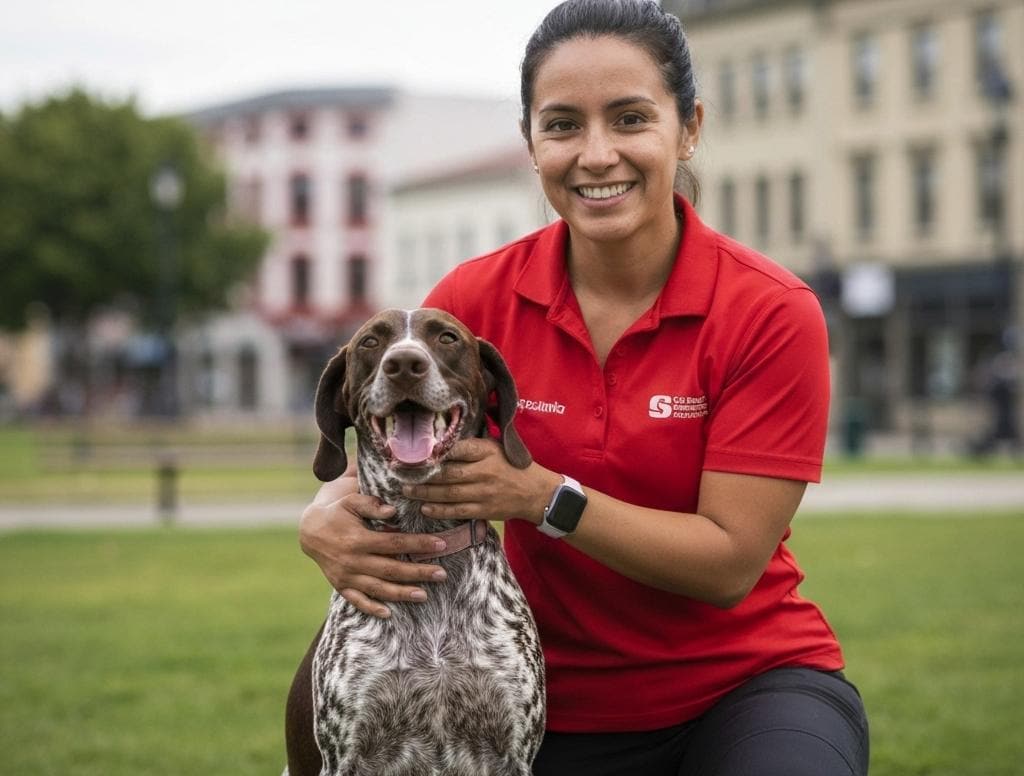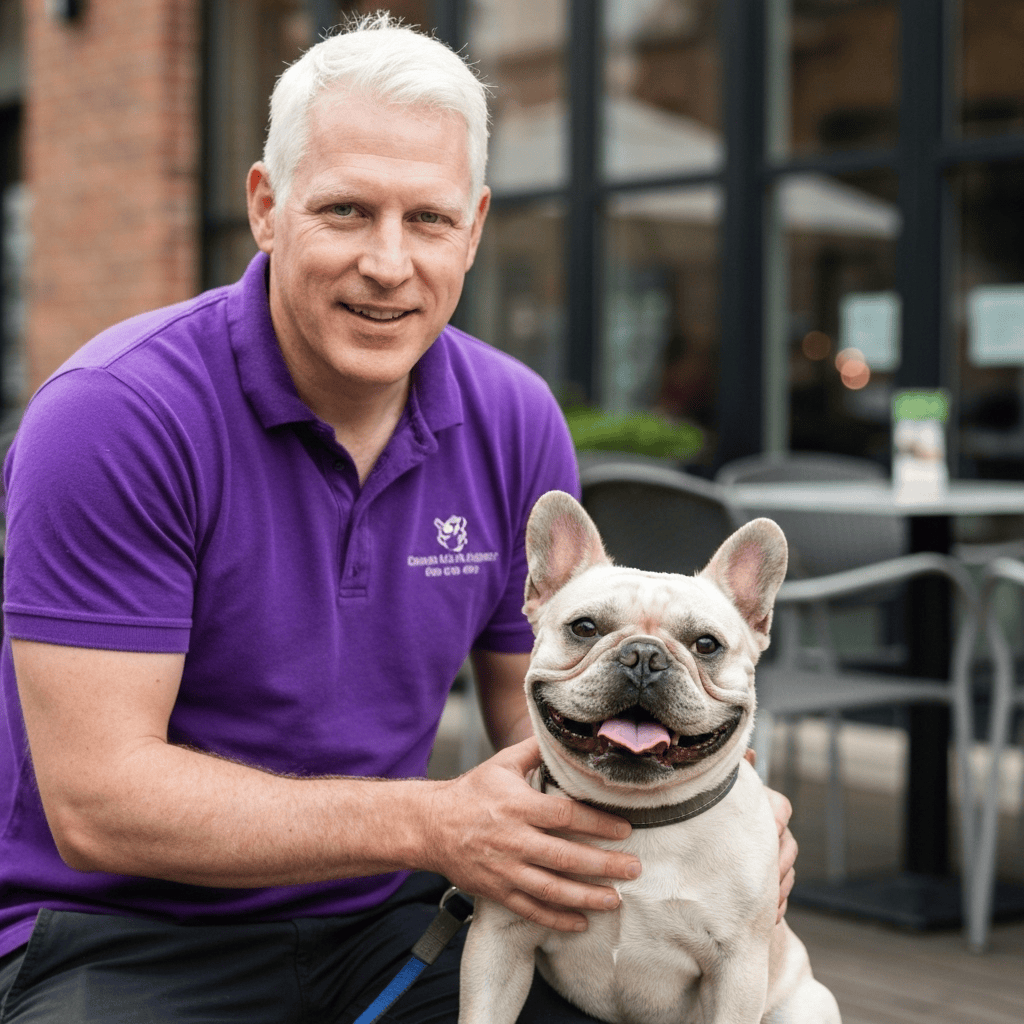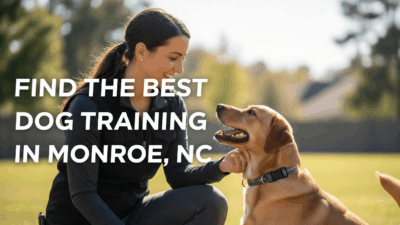Your Complete Guide to Choosing a Dog Trainer in Monroe
If you live with a dog in Monroe, you know the challenges. There’s the hustle and bustle of weekend events downtown, kids on bikes zooming through neighborhoods, and those inevitable encounters with other dogs at local parks. Your pup might be perfectly behaved at home but turn into a different animal when you hit Main Street.
That’s where good training comes in. A well-trained dog makes life easier for everyone, whether you’re walking through downtown Monroe or enjoying a Saturday afternoon at one of Union County’s parks. But here’s the thing – not all dog trainers are created equal, especially when it comes to understanding what life is really like in our area.
You need someone who gets Monroe. Someone who knows that your dog needs to handle everything from the farmer’s market crowds to the quiet trails at Cane Creek Park. Let’s walk through what you should look for and what you can expect.
How to Choose the Right Trainer
Start with their methods. You want a trainer who uses positive reinforcement – that means rewarding good behavior instead of punishing the bad stuff. This approach builds trust between you and your dog, which makes everything else easier down the road.
A good trainer will sit down with you and your dog first, not jump straight into commands. They should ask about your daily routine, where you like to walk, and what specific problems you’re dealing with. Maybe your dog pulls like a freight train when you’re trying to enjoy a peaceful stroll, or perhaps they lose their mind every time they see another dog.
Look for credentials. Training your dog isn’t something you want to leave to chance. Professional certifications like CPDT-KA or KPA-CTP show that a trainer has studied animal behavior and learning theory. For more serious issues like anxiety or aggression, you might want someone with specialized certifications like IAABC-CDBC or CBCC-KA.
The best trainers understand that real life happens outside the training facility. They should have a plan for gradually introducing your dog to the distractions they’ll actually face – like practicing loose leash walking in quiet neighborhoods before tackling the Saturday crowd at the Monroe Farmers Market.
Common Dog Training Methods Explained

Positive reinforcement is pretty straightforward – when your dog does something you like, they get something they want. It might be a treat, praise, or a chance to sniff that fascinating fire hydrant. This method works because dogs naturally repeat behaviors that get them good things.
The beauty of positive training is that it builds confidence. Instead of worrying about making mistakes, your dog starts looking for ways to earn rewards. That confident, eager-to-please attitude makes everything from recall training to polite greetings much easier.
For dogs with fear or reactivity issues, trainers use something called desensitization and counter-conditioning. Sounds fancy, but it’s really about changing how your dog feels about scary things. If your dog barks at other dogs, for example, a trainer might start by rewarding calm behavior when other dogs are far away, gradually decreasing the distance as your dog gets more comfortable.
Puppy training focuses on the big stuff early – house training, basic manners, and socialization. The goal is to set your puppy up for success in all the places you’ll go together around Monroe and Union County.
Average Cost of Dog Training in Monroe (Updated for 2025)
Training costs in Monroe are pretty similar to what you’ll find in the greater Charlotte area. Prices can vary based on the trainer’s experience, how far they travel, and how complex your dog’s issues are.
| Service Type | Typical Price Range (Monroe/Union County) |
|---|---|
| Group classes (4–6 weeks) | $160 – $300 total |
| Private lessons (60–90 minutes) | $100 – $175 per session |
| Puppy training package (4–6 lessons) | $380 – $700 total |
| Day training (trainer works dog, then coaches you) | $500 – $1,000 per week |
| Board and train (2–4 weeks) | $2,000 – $4,200 total |
| Behavior consultation (reactivity, anxiety) | $125 – $250 initial session |
Make sure you understand what’s included in these prices. Some trainers include equipment and follow-up support, while others charge extra for travel time or training materials.
Local Laws, Permits, and Practical Tips
Monroe keeps things pretty simple when it comes to dog laws. Your dog needs to be under control in public, which typically means on a leash unless you’re in a designated off-leash area. Always carry waste bags and clean up after your dog – it’s not just good manners, it’s the law.
Vaccination requirements in Union County follow North Carolina state rules. Your dog must have a current rabies vaccination and wear the rabies tag. For the most up-to-date information about rabies requirements, check NC DHHS Rabies.
Here’s something many people don’t know – there’s no special license required for dog trainers in North Carolina. Anyone can call themselves a dog trainer, which is why those certifications we talked about earlier are so important. However, if a trainer offers board and train services, their facility needs to comply with state rules for boarding kennels. You can learn more through the NC Department of Agriculture Animal Welfare Section.
Professional trainers should carry liability insurance. This protects both of you if something goes wrong during training, and many parks or community centers require proof of insurance before allowing group classes.
For local animal concerns and resources in Union County, Union County Animal Services is your go-to resource.
Questions to Ask a Potential Dog Trainer
When you’re interviewing trainers, don’t be shy about asking detailed questions. A good trainer will appreciate your thoroughness and should be happy to explain their approach.
- What methods do you use, and how do you keep training fear-free and humane?
- What certifications do you hold, such as CPDT-KA or KPA-CTP?
- How will you tailor the training program to my dog and household?
- Where will sessions take place, and when will we practice in public around Monroe?
- How do you measure progress and decide when to add distractions?
- What is included in my package, and what’s the total cost?
- Do you carry liability insurance, and can you provide proof?
- For reactivity or anxiety, do you coordinate with veterinarians if needed?
- What daily homework should I do between training sessions?
Local Monroe Resources for Dog Owners
Finding good places to practice with your dog can make all the difference in your training success. Here are some local spots that work well for different types of training.
Crooked Creek Park Dog Park in Indian Trail has separate areas for large and small dogs, plus walking paths nearby. It’s perfect for practicing recall in a fenced area before trying it in more challenging environments. Check current hours and rules through the Town of Indian Trail.
Cane Creek Park offers miles of trails and beautiful lake views. Dogs must stay leashed, but it’s an excellent place to work on loose leash walking and focus around wildlife distractions. You can find more details at Union County Parks.
If you don’t mind a short drive, William R. Davie Dog Park in South Charlotte has large open fields and plenty of shade. It’s worth the trip for dogs who need more space to run and play. Check out all of Mecklenburg County’s dog parks at Mecklenburg County Dog Parks.
For trail adventures throughout North Carolina, most state parks welcome leashed dogs. Before you head out, review the pet policies at North Carolina State Parks.
And if you ever need to contact local animal control, Monroe’s information is available at Monroe Animal Control.
Common Services You’ll See
Group classes are great for socialization and basic obedience. Your dog learns to focus on you even when other dogs are around, plus you get to meet other local dog owners dealing with similar challenges.
Private lessons or in-home training make sense when you need to address specific problems or work around your schedule. This is especially helpful for leash reactivity, since you can practice right in your own neighborhood where the problems actually happen.
Day training and board and train programs can jump-start progress when you’re short on time or dealing with serious behavioral issues. Just make sure the trainer has a solid plan for transferring those new skills to you, so your dog doesn’t revert to old habits once they come home.

Common Questions About Dog Training in Monroe
How much does in-home dog training cost?
Most trainers in the Monroe area charge $100 to $175 per session for in-home training. The price depends on the trainer’s experience, how far they travel, and what you’re working on.
Is in-home dog training worth it?
Absolutely, especially if you’re dealing with problems that happen at home or in your neighborhood. It’s particularly valuable for leash reactivity, door manners, or house training issues since you can work on the problems right where they occur.
Can you pay someone to house train your dog?
Yes, many trainers offer puppy packages that include house training plans. They’ll teach you how to set up a schedule, manage accidents, and reward success so your puppy learns faster.
What is the 3-3-3 rule for dog training?
This is a helpful guideline for new dogs – it takes about 3 days for them to decompress from big changes, 3 weeks to learn your routines, and 3 months to really settle in and feel at home. Training should always go at your individual dog’s pace though.
How long will it take to reach my training goals?
For basic manners like sit, stay, and loose leash walking, you’ll often see progress within 3 to 6 weeks if you practice consistently. More complex issues like reactivity or separation anxiety usually take longer and need a more structured approach.
What should I bring to group classes?
Pack a 6-foot leash, a properly fitted collar or harness, high-value treats your dog loves, water for both of you, and vaccination records if the trainer requests them. Leave retractable leashes at home – they make it harder to maintain control in a group setting.
What’s the leash law in Monroe?
Dogs must be under control in public spaces, which means leashed in most areas unless you’re in a designated off-leash dog park. For specific questions about local ordinances, contact Monroe Animal Control.
Do I need a dog license in Monroe or Union County?
There’s no separate pet licensing program commonly required here. Just make sure your dog has current rabies vaccination and wears the rabies tag as identification, and stay aware of any city notices or changes.
What shots does my dog need in Union County or North Carolina?
North Carolina requires rabies vaccination for all dogs. Your veterinarian can recommend additional vaccines based on your dog’s lifestyle and risk factors. For current state requirements, see NC DHHS Rabies.
Are dog trainers required to be licensed in Monroe or Union County or North Carolina?
No special trainer license exists in our state. However, board and train facilities must follow state boarding kennel regulations under the NC Animal Welfare Section. Always ask any trainer for proof of business insurance.
Where can I practice off-leash recall?
Fenced dog parks are your safest bet – try Crooked Creek Park’s dog park in Indian Trail or William R. Davie Dog Park in South Charlotte. Practice during less busy times and keep sessions short and positive.
Which dog parks allow training around Monroe?
The main options are Crooked Creek Park Dog Park in Indian Trail and William R. Davie Dog Park in South Charlotte. For on-leash practice, Cane Creek Park offers great trails with varying levels of distraction.
What beaches or trails allow dogs for training?
Cane Creek Park welcomes leashed dogs on most trails, and it’s perfect for working on focus around wildlife and other hikers. Many North Carolina state park trails also allow leashed pets – just check the specific rules at North Carolina State Parks before you visit.
Do parks require permits for commercial classes?
Some parks and community centers do require permits or proof of insurance for group training classes. Any professional trainer should handle this paperwork and be upfront about where they’re allowed to hold sessions.
Finding the right dog trainer doesn’t have to be overwhelming. Focus on someone who uses humane, science-based methods and understands what daily life looks like for you and your dog in Monroe. Look for proper credentials like CPDT-KSA or similar certifications, and don’t forget to ask about insurance coverage.
Remember, good training is an investment in years of better walks, more relaxed outings, and a stronger relationship with your dog. Take your time choosing the right fit – both you and your pup will be glad you did.
